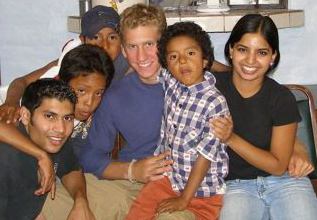 The only thing Lucie Ganz is nervous about is the plane ride.
The only thing Lucie Ganz is nervous about is the plane ride.
The 19-year-old Toronto resident left for Costa Rica in late December for a “volunteer vacation” with Global Volunteers, a Minneapolis-based volunteer organization.
Global Volunteers arranges experiences for solo travelers ages 18 and older, coordinates longer-term volunteer opportunities for students, and welcomes children of all ages who are traveling with a parent or guardian.
Ganz doesn’t really expect it to be much of a vacation, which is fine with her. “I’ll be building,” she says, “to help the locals.” The point, she says, isn’t a vacation, it’s “working with people.”
Bud Philbrook, co-founder and CEO of Global Volunteers, believes that Yager has the right attitude. He calls the volunteers “server-learners” and notes that they’re in these communities for both of those reasons – to serve and to learn.
For teens, he says, the experience can frequently be the first time they’ve gone into another community and, as a result, “has the potential for even greater impact.”
Voluntourism in general is booming in recent years – more than 10 percent of American travelers say they planned a volunteer vacation in 2007, according to Travelocity’s 2006 annual poll. It’s also a sector that seems to be resonating with young people, judging from the number of organizations that gear trips towards teens.
Earthwatch Institute is another group that is targeting young people for its expeditions. Participants between the ages 16 to 18 can join programs consisting of other teen volunteers and group leaders – no parents allowed (though family programs are also available). John Jorgensen, director of marketing and communications for Earthwatch points out the teens are increasingly aware of the “environmental crisis we now face and are eager to get out and make a difference.” As a result, Earthwatch is expanding its teen program in order to “harness this potential,” says Jorgensen. “After all, today’s teens are tomorrow’s leaders.”
 Greg Tehven has built the Pay it Forward Tours of his Students Today Leaders Forever business around this notion. In a recent VolunTourist Newsletter, Tehven commented that he thinks voluntourism is so important to young people because so many of them feel “unappreciated … a lot of us have found through service, we can do things we never imagined.”
Greg Tehven has built the Pay it Forward Tours of his Students Today Leaders Forever business around this notion. In a recent VolunTourist Newsletter, Tehven commented that he thinks voluntourism is so important to young people because so many of them feel “unappreciated … a lot of us have found through service, we can do things we never imagined.”
It’s addicting, he adds. “When we serve we learn so much about ourselves, the power that we have, the opportunity we have to contribute.” And that, he says, frequently spurs young people on to a life of volunteer commitments.
And while most go into these experiences expecting to get nothing “tangible” out of the experience, Earthwatch’s Jorgensen points out that young people shouldn’t overlook the experience’s value as a resume builder, not to mention an incredible educational experience. Indeed, Earthwatch offerings include monitoring climate change in the Arctic to helping regenerate rainforest diversity in Puerto Rico.
Ganz hopes to pick up some Spanish and figures the physical labor will be a “good start to being healthy and active.”
She’s going on her own – no Mom, no friends – and anticipates being the only Canadian on the American-based trip. It’s an experience her 20-year-old brother knows first-hand. Russell Ganz was in Costa Rica two summers ago on a similar project.
His mother, Dawn Yager, is a firm believer in the power of these experiences. “It’s hard for me to express how little he has to say to me in ordinary circumstances,” she says. But one day he called her from Monte Verde, “ How he spoke to me on the phone that day, how heartfelt the conversation was, kind of shocked me … This is a kid who simply doesn’t speak about anything personal at all.” She also says he brought back a great improvement in his cooperative team skills and even learned a bit of Spanish.
 What do teens, and their parents, need to consider before undertaking such an experience?
What do teens, and their parents, need to consider before undertaking such an experience?
Philbrook believes the number one thing they need to possess is flexibility. He points out that these young people are going into another’s culture and need to be prepared to adapt to that. Yager laughs at her son the “picky eater” who came back eating rice and beans. “He even brought a recipe back for me.”
Also, keep in mind that age requirements may vary based on the destination and type of experience, so flexibility is a must for younger teens that have their heart set on a particular country or activity.
Philbrook explains that volunteers must also abandon the notion that you’re going “to help those poor people.” It isn’t constructive thinking, he says. “What is constructive is to go prepared to work side by side, under the direction of the locals.”
And like Ganz, don’t necessarily expect a “holiday.” As a tourist, says Philbrook, “you’re an observer. As a volunteer, you’re a participant.
“When you engage with another person, you realize we are more alike than different.”
Leslie Garrett is author of The Virtuous Consumer: Your Essential Shopping Guide for a Better, Kinder, Healthier World.Visit her at www.thevirtuoustraveler.com.
Previously By Leslie Garrett::
Carbon Offsets: Travel With a Clean Conscience?
Eco-Oakland: The City You Only Thought You Knew
Chicago: More Green Than Meets the Eye
The Good, The Green and the Downright Crazy Tours
Don’t forget to check out our Responsible Travel section for more travel tips that are good for the Earth. And if you’re in to helping others, don’t miss our Voluntourism section.
Photo credit (photos #2 and #3): Global Volunteers












